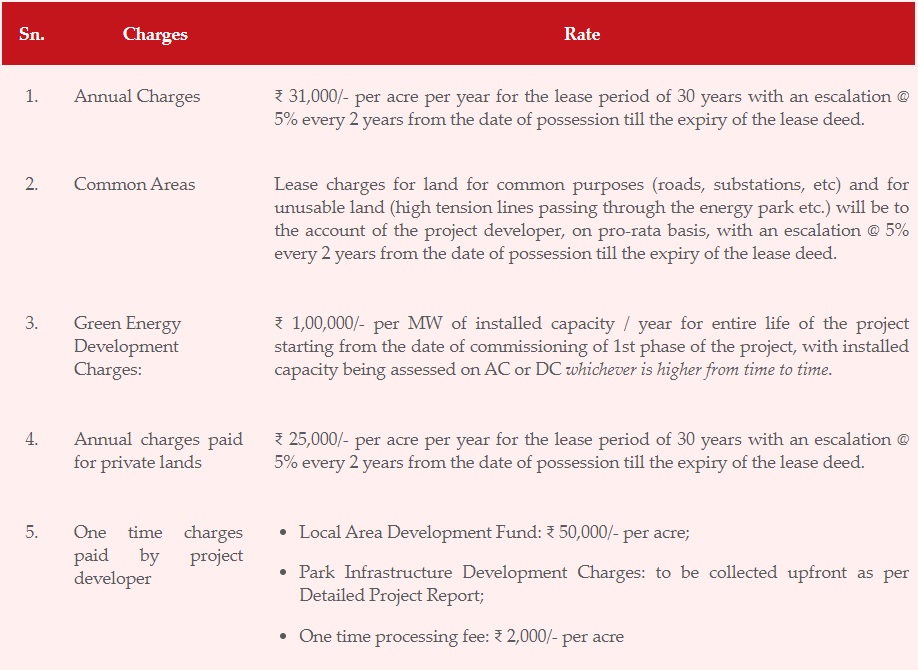
The Government of Andhra Pradesh (the “State Government”) vide its order no. G.O.Ms. No. 20 dated July 17, 2020 notified Andhra Pradesh Renewable Energy Export Policy, 2020 (the “Policy”) in concurrence of Finance in U.O.No.FIN01-FMU)ASD(IIE)/4/2020-FMU-IIEIC(Computer.No.1132369), dated, April 09, 2020.
Highlights of the Policy
- The Policy has been formulated taking into consideration the huge untapped potential and availability of lands in the state and to encourage, develop and promote renewable energy projects by investors for the purpose of energy export outside Andhra Pradesh without any obligation of procurement of power by State DISCOMs, decided to notify the Policy;
- The objective of the Policy is to facilitate, (a) 120 GW renewable energy projects; (b) lease of 5,00,000 acres of potential land to renewable energy export project developers; (c) attract private investment; (d) promote setting up of renewable energy equipment manufacturing facilities in the State; and (e) generate additional revenue;
- The Policy shall be applicable to solar / wind / wind-solar hybrid projects for a period of 5 years with effect from July 17, 2020 during which all registered companies either in private sector or public sector shall be eligible for project development;
- Allocation of renewable energy resource to project developers in any area shall be done on “first come first serve basis” and priority shall be given to such developers intending to set up energy exports projects along with manufacturing facilities in the state;
- The power generated from the projects shall be exported outside the state and in case of supply of this power within the state, the same shall achieved under Open Access regulations with all charges levied by A.P. State Electricity Regulatory Commission to be paid and all connected regulations complied with;
- Any injection of energy between synchronisation and declaration of commercial operations date shall be treated as an inadvertent power and no cost shall be paid by any distribution company(ies) in the state;
- State Government through a land aggregating agency will procure and aggregate government and private lands at potential locations for allotment to the project developers on lease basis for a period of 30 years;
- The following charges shall be paid by the project developer:

- Connections to State Transmission Utility (STU) and Central Transmission Utility (CTU) networks:Connection to STU
Two options have been provided to the project developers:
Option 1:
- The project developer may connect to STU by laying connecting line to the STU grid substation at its cost and transferring the line asset to APTRANSCO prior to commissioning;
- Alternatively, the connecting line may be built by APTRANSCO at the cost of the project developer if it so chooses;
- Project Developers using the IntraState Transmission network shall pay for Transmission charges and losses as prescribed by APERC in the Transmission Tariff Order;
Option 2:
- The project developer(s) may bear the entire cost of existing or new external evacuation infrastructure including connecting line, grid substations and upstream network up to CTU;
- The construction of new network infrastructure shall be done under the supervision of APTRANSCO and the assets handed over to APTRANSCO before commissioning;
- The new network augmentation required for this purpose shall be determined by APTRANSCO; and
- Developers opting for this option shall pay only the O&M charges as decided by APTRANSCO and the transmission charges shall be exempted for entire life of the project. There shall be no exemption on energy losses.
Connection to CTU
The project developers shall follow the procedure laid down by central agencies. All liabilities on account of connecting to CTU shall be borne by the Project Developer.
- Incentives by State Government include conversion of lands prior to the execution of the lease agreements and apart from conversion fee for conversion from Agriculture” use to “Non-Agriculture” no further charges to be levied on the park or project developer and projects will be exempted from obtaining any consent under pollution control laws from AP Pollution Control Board; and
- The following additional incentives shall be applicable for new manufacturing facilities, equipment and ancillaries related to renewable energy setup in the State:
- Priority allotment of land on long term lease basis;
- Exemption from payment of Electricity Duty for a period of 10 years from date of commencement of manufacturing activities; and
- Extending of incentives as per the prevailing Industrial Promotion Policies of the Government of A.P.
- If any conflict arises with existing policies, this policy shall take precedence over the earlier policies issued in the matter.
Originally published 17 August, 2020
The content of this article is intended to provide a general guide to the subject matter. Specialist advice should be sought about your specific circumstances.
By K Venkat Satyanarayana and Himanshu Mene
Link Legal India Law Services















